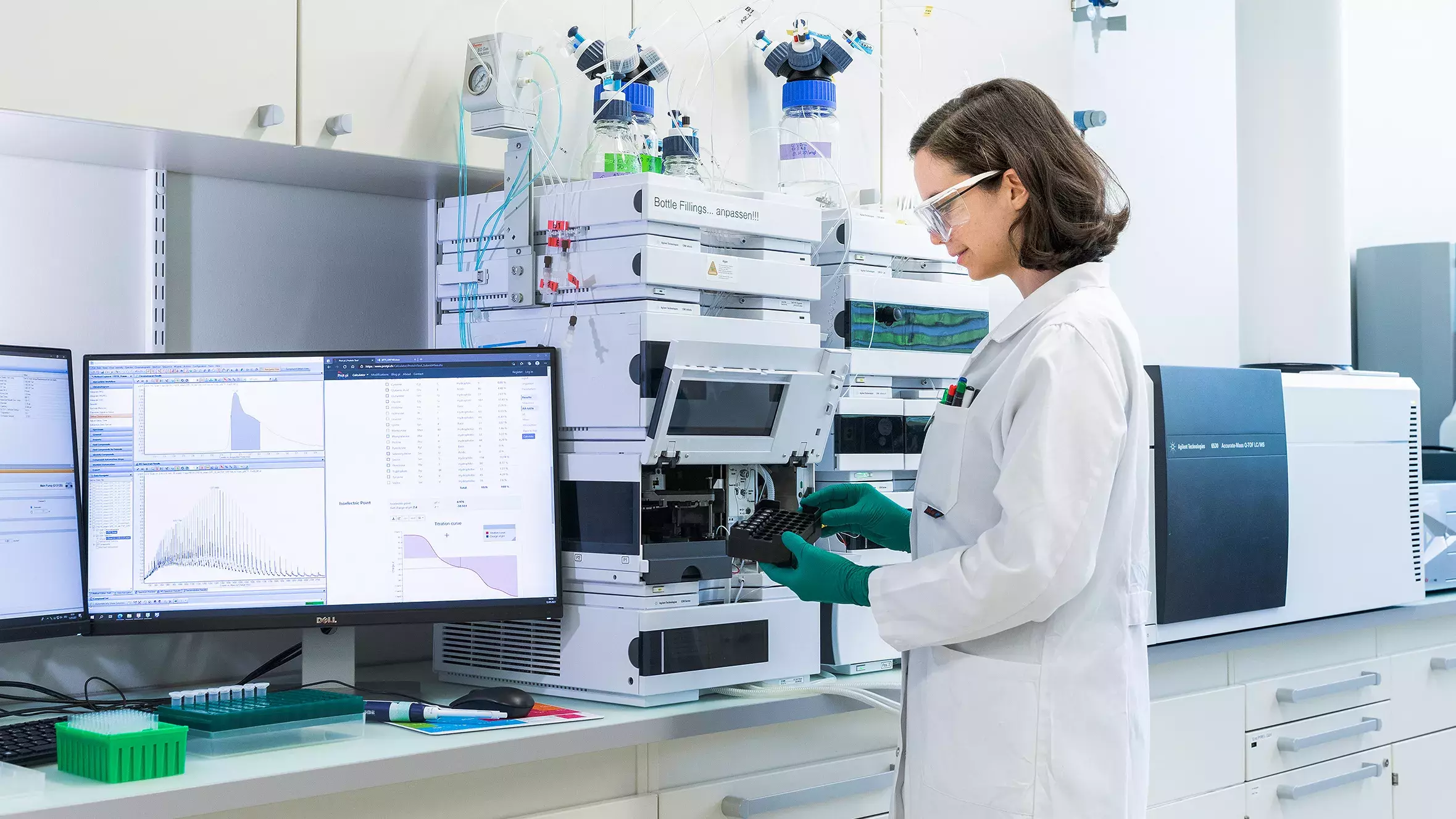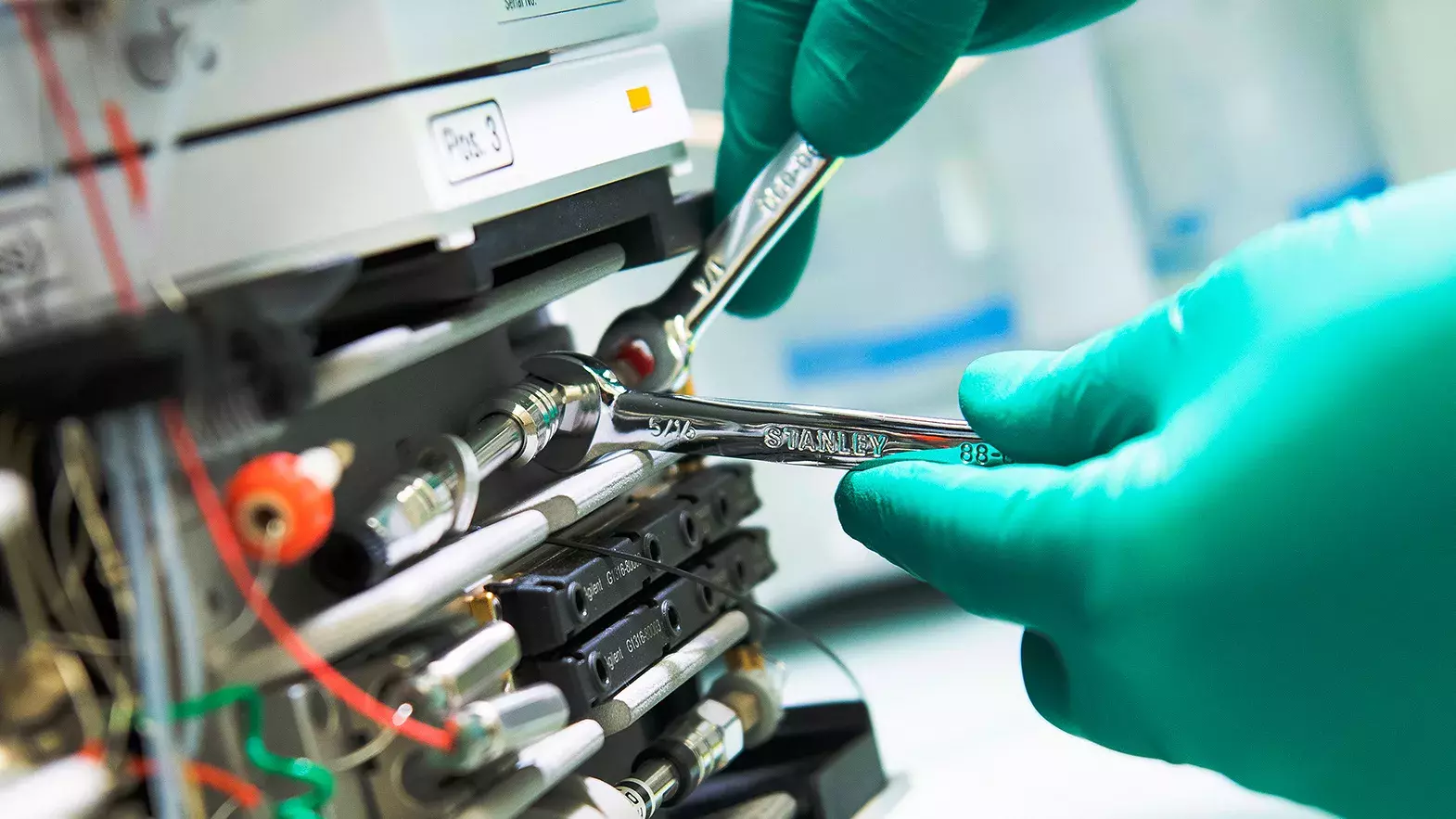Section Bioanalytics

«Proteins form the structure and chemistry of life. Their enormous diversity, their specialization and their potential for therapeutic use are overwhelming and make biochemistry and bioanalytics pioneering disciplines.»
Expertise
The Bioanalytics team carries out research and development projects with industry and university partners and pursues further research interests in the structure-activity relationship of proteins from bacteriophages (phages). We utilize our experience in the fields of protein engineering, recombinant protein technology, downstream processing, early development of biologics and bioanalytics and the infrastructure of our well-equipped laboratories.
Protein engineering
For the elucidation of structure-activity relationship in proteins we modify amino acid residues or entire domains in a structure-guided manner. Analyses include truncations, single domain investigations, cross-linking, protein fusions and others.
Recombinant Protein Technology
We recombinantly express therapeutic proteins for target development, for preclinical studies and other bioanalytical investigations in prokaryotic (E. coli) and eukaryotic host expression systems (HEK and CHO). Expression constructs and protocols are optimized to obtain soluble target molecules at high expression rates. We have a long-term track of soluble protein expression such as monoclonal antibodies and novel formats thereof as well as of membrane proteins.
Downstream Processing
We purify proteins for preclinical purposes and for bioanalytical characterizations at laboratory scale using different downstream processing methods, achieving high purity as requested for biopharmaceuticals by regulatory authorities and for protein characterization in general. We perform classical purification processes and we employ DoE for automated screening of optimal purification conditions.
Early Development of Biologics
Early stages of development of biopharmaceuticals involve analysis of a larger number of candidates regarding stability, solubility, specificity and affinity. These parameters will, among others, define qualification of a biopharmaceutical for further development to a safe drug substance. We offer a broad selection of orthogonal bioanalytical methods to assess developability for candidate molecules. We are experienced with developability assessments of monospecific and bispecific antibodies as well as with antibody-drug-conjugates (ADC).
Bioanalytics
Given the high complexity of biopharmaceuticals with protein and carbohydrate moieties, assessment of pharmacokinetics and immunogenicity of biotherapeutics require extensive analytics to guarantee identity, stability and efficacy. We apply a diverse portfolio of bioanalytical methods to characterize proteins including their post-translational modifications.
Further, we develop novel, quantitative methods for the characterization of molecular processes during the infection of bacterial pathogens by bacteriophages (phages). We focus on the elucidation of structure-activity relationship of phage tailspike proteins which are involved into the infection process.
Bioinformatics
Accurate calculation of physicochemical parameters is a prerequisite for experimental planning as well as for bioanalytical data analysis. Since available web applications do not fully meet our requirements, we have developed a web application with substantial extensions of parameter calculations and strongly enhanced accuracy.
Research & Development
The Bioanalytics team carries out research and development projects with industrial partners and pursues further research interests in the structure-activity relationship of phage proteins. We utilize our experience in the fields of protein engineering, recombinant protein technology, downstream processing, early development of biologics and bioanalytics and the infrastructure of our well-equipped laboratories.
Selected Projects
Development of an Innovative Method for the Detection of Botulism
- Project Leader and contact person: Prof. Dr. Sabina Gerber
- Project status: started on January 1st, 2024
- Funding partner: Federal Office for Civil Protection (FOCP)
- Project partner: LABOR Spiez, Medizinische Hochschule Hannover (MHH)
Characterization of Tailspike Proteins from Bacteriophages
Antibiotic resistance in human pathogens is dramatically increasing worldwide. Bacteriophages (phages) are an attractive alternative for combating infectious bacteria in humans because they invade and inactivate their hosts in a highly specific manner. However, the molecular mechanism of infection is not well understood. In cooperation with the Food Microbiology Research Group we investigate the function and mechanism of phage tailspike proteins for elucidation of the molecular basis of the infection process.
Molecular mechanism of bacteriophage tail spike proteins in bacterial infection
Development of novel, locally retained biopharmaceuticals for brain cancer treatments
- Project leader and contact person: Prof. Dr. Sabina Gerber
- Project status: started on March 1st, 2024
- Funding partner: Innosuisse
- Project partner: InCephalo
Terminated projects
Determination of Glycan Profile and Sequence Variants of Certified Ricin Reference Material and Characterization of Glycans of Abrin
In a 5-years Horizon2020 project in cooperation with 13 European partners, we established the glycan profiles and sequence variants of protein toxins ricin and abrin, members of type II ribosome-inactivating protein (RIP) family.
EuroBioTox
Team
-
Lecturer in Bioanalytics and Biochemistry
Students
- Lilian Mutter
- Belinda Wipf


